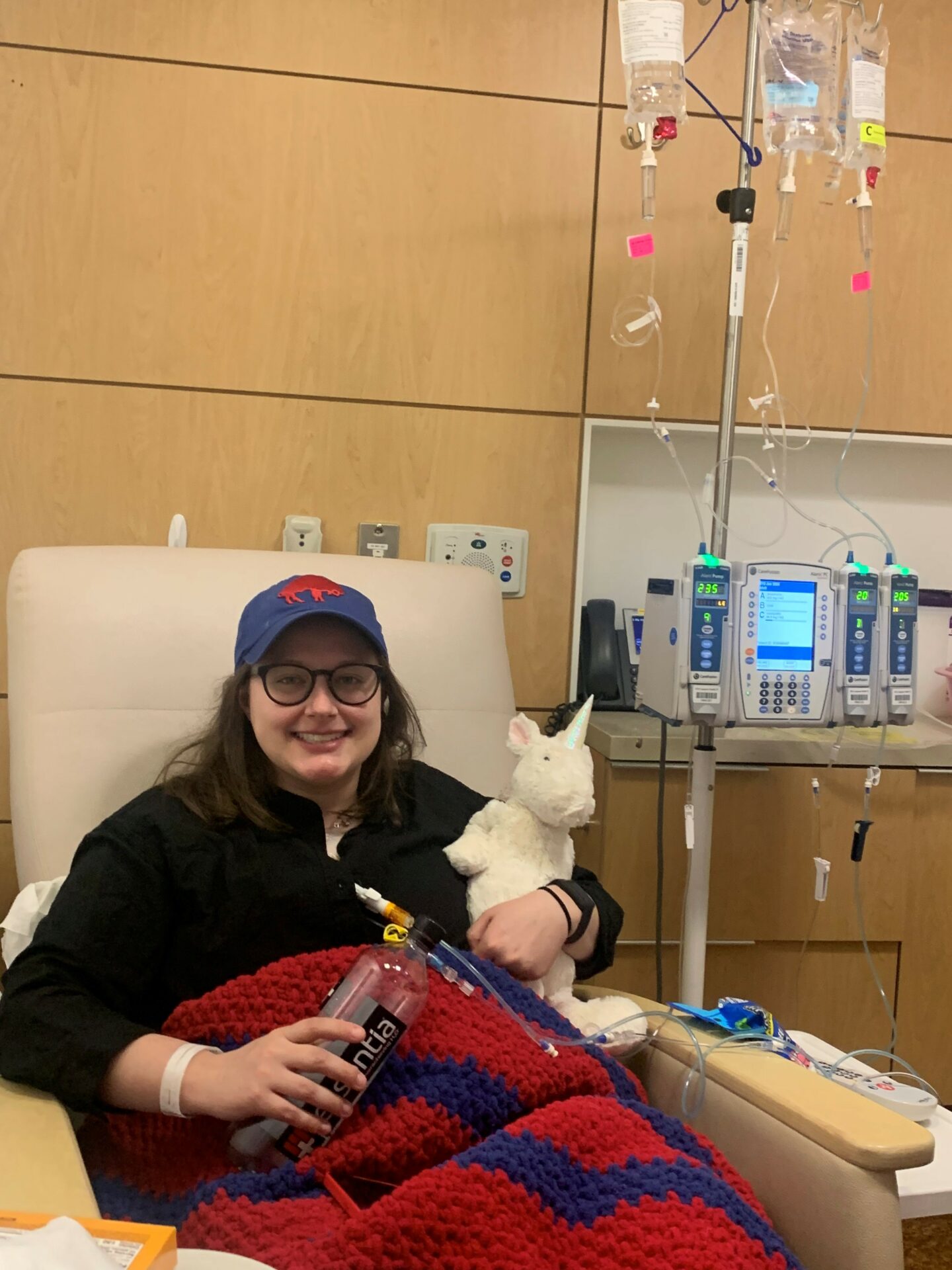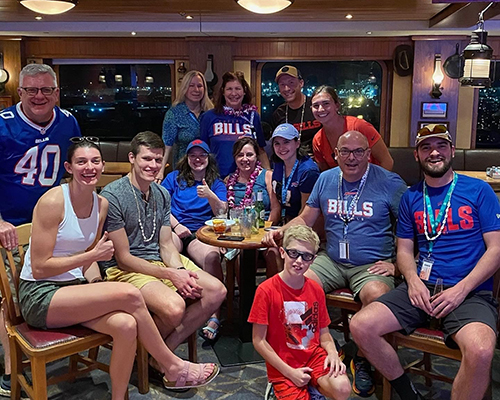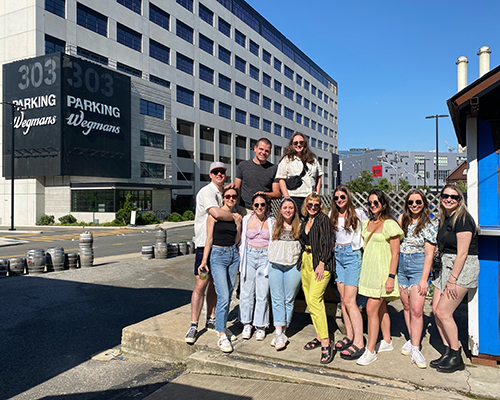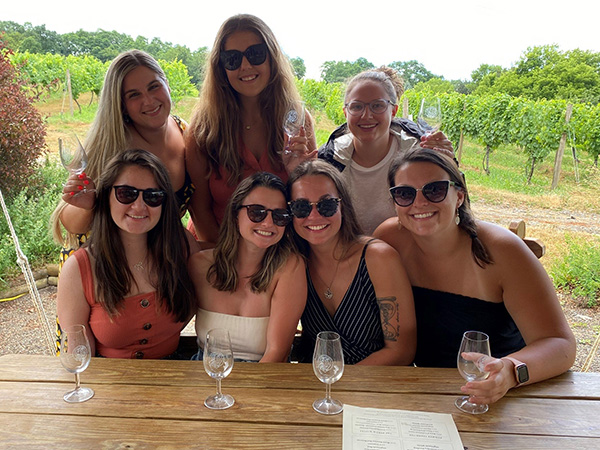Lauren Ver Steeg: Fighting Cancer with Research, Inspiration and a Little Humor
Lauren Ver Steeg was recently diagnosed with stage 3 rectal cancer. Her mindset, humor and support system – along with promising cancer research – have encouraged her along the way.
At 26 years old, cancer seems to be the last thing on your mind. But when blindsided with a cancer diagnosis, it quickly comes to the forefront.
Lauren Ver Steeg, a young advertising professional in New York City, experienced this shock when diagnosed with stage 3 rectal cancer in October 2023.
She never expected to hear the words, ‘you have cancer’. She had some blood in her stool and severe stomachaches but thought she might have stomach ulcers. An initial appointment with her primary care physician led to an appointment with a gastroenterologist, leading to a colonoscopy. Her mom came to support her through the procedure, and they both received the news that she had a tumor.
Her doctors moved her quickly through the system. She met with a colorectal surgeon the next day and then began her treatment with her oncologist. The quick movement created less waiting and less time for anxiety. Lauren was thankful for the speedy response from her medical professionals and for their continued confidence.
“It was just a relief that all of the doctors were like, ‘OK, we’re going to do this. We are going to get it done – this is the plan,’” Lauren said. “It was a relief that all of the doctors were moving so quickly and taking it so seriously. It kind of let me be able to not be concerned about that side of things, just focus on the concern of the tumor.”

Lauren’s Treatment
The first step was 30 days of radiation. She made a paper chain with 30 links, and then every day she would cut one off to count down. It was a simple reminder of seeing the finish line.
Then came a month break, which allowed her to return to her “normal” life, which cancer had interrupted. She went skiing, hung out with friends, and more.
“I told my oncology team, ‘I have to be honest; it was lovely not seeing you for a month,’” Lauren said. “I was living like not a cancer patient for a month, which was a welcome change.”
In February 2024, Lauren returned to treatment and had her port placed. She’s been in chemotherapy since then – a little over halfway done as of early May. There have been some ups and downs along the way, and a couple of sessions delayed because of low blood counts, but she keeps pushing through it.
While she keeps a positive attitude, she also recognizes this battle comes with mental hardships. Going through cancer is extremely challenging, and Lauren, a self-described extrovert, misses her co-workers and friends.
“It’s definitely a mind game,” Lauren stated. “Chemotherapy is a game that you have to play with yourself and it’s really tough. You’re more alone, and honestly, it sucks, but we’re getting through it.”
Cancer research continues to give new treatment options to patients every day. For Lauren, she’s seen the power of research through how the path of her treatment has changed from years past.
When she finishes a chemotherapy appointment, she leaves with a fanny pack that holds a pump. One of her chemotherapy medications continually pumps for the next 46 hours. Just 10 years ago, a patient would have had to be admitted into the hospital for this to be administered. While it’s still not fun, Lauren is thankful for this development and the comfort of being in her own home.
See ya, Stu
There’s a saying that laughter is the best medicine.
Lauren describes herself as someone consistently joking around, and it hasn’t stopped while undergoing treatment. This humor, along with support from her friends and family and assurance from her doctors, have helped her mindset while fighting.
“You try not to go to a super dark place, which I’ve been able to kind of stay out of. I’m definitely a person that copes using humor quite a bit. And, there’s no shortage of butt jokes when you get diagnosed with a tumor in your butt.”
A care package from her coworkers was full of goodies that might help with treatment, but one thing stood out: a book of butt jokes. As Lauren said, “It’s 101 funny butt jokes for kids 8-12, or recently diagnosed rectal cancer patients.”
 As for one that stuck out:
As for one that stuck out:
How does a butt keep cool? By using it’s fanny.
In addition to the jokes, Lauren named her tumor Stu, short for “Stupid Tumor.” Her mom, an art director, created a drawing of Stu, and Lauren and her family sold t-shirts raising money for other colorectal cancer patients.
In an incredibly heavy situation, Lauren’s humor and laughter was an outlet to keep things light.


It Takes a Team
Ten years ago, legendary ESPN commentator Stuart Scott was named the recipient of the Jimmy V Perseverance Award at the 2014 ESPYS. He delivered a speech during his own cancer journey that night, and one quote has resonated with Lauren during her own battle.
“So live. Live. Fight like hell. And when you get too tired to fight, then lay down and rest and let somebody else fight for you. That’s also very important. I can’t do this ‘Don’t Give Up’ thing all by myself.”
When Lauren is tired and simply can’t do things some days and needs the pick-me-up, her community is there. From her parents, sister and friends attending countless doctor’s appointments and chemotherapy sessions to her friends sending daily encouragement, it’s overwhelming (in a good way!) how much support she has, and she couldn’t be more grateful.
“There are times I just sit there, and I think I’m so beyond lucky that they can pick up the fight when maybe I can’t, and just really want to see me do well and get better,” Lauren said. “It’s a really special thing. I can’t say enough just how appreciative I am of all of them.”
Moving Forward
Lauren continues to go through her cancer journey the best way she knows how – drawing inspiration from her support system and others, and with a little bit of humor. Her mindset has helped her through this physical and mental journey against cancer.

“Everyone says, ‘Oh, you’re so strong,’ and you don’t feel strong when you’re going through cancer treatment at all. But, now looking back at radiation, you know what? I was really f—ing strong when going through that.”
Through these experiences, Lauren has seen how research in the past is now helping her in her own battle and others’. She recognizes and is inspired by people who have participated in past clinical trials to further research advancements.
Like Jim Valvano founding the V Foundation during his battle, she wants to make the most of the cards she has been dealt and use her experience to help others. Lauren is actively working with a team at New York University researching how different cancer services are available and used by people in different demographics.
Cancer research in the past has changed the game for patients today. And today’s research will help millions in the future.




